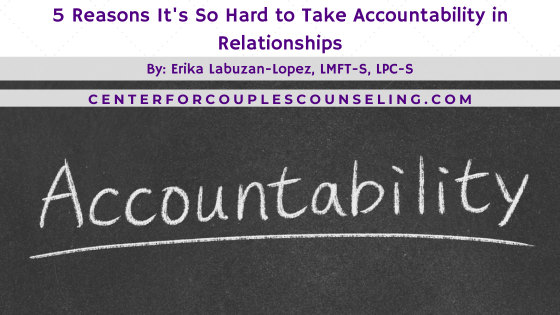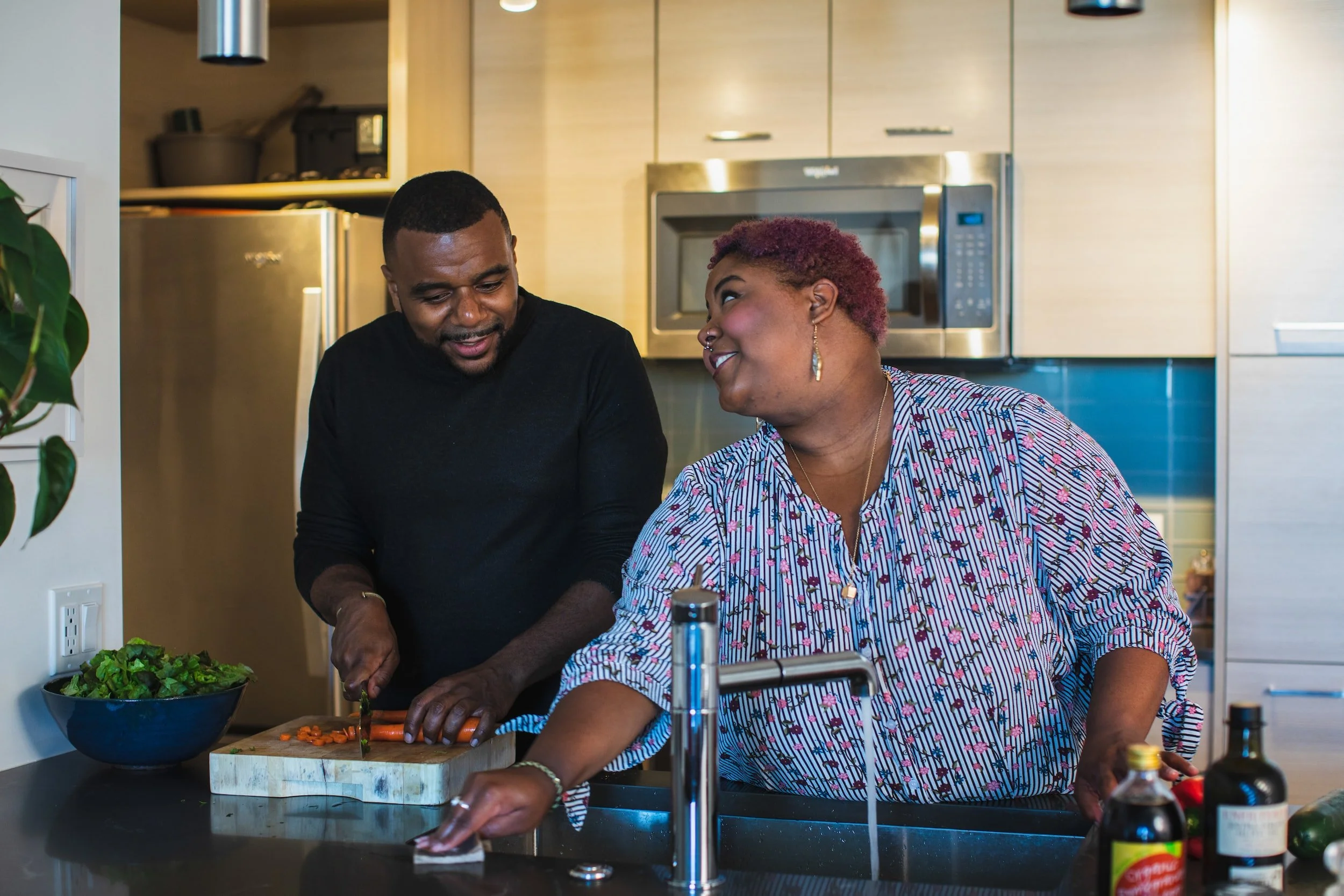5 Reasons It's So Hard to Take Accountability in Relationships
Have you noticed how many times you broke the egg after reading last week’s blog? I know I have several times since I wrote it, and I do this for a living. We’re all going to break some eggs now and again, but what makes it so damn hard to admit it? Why does it take an escalated 3 hour argument to arrive at the sentence “I’m so sorry I hurt you”?
As couples therapist extraordinaire Terry Real discusses in his book US, disharmony isn’t really a problem in relationships. In fact, it’s essential in relationships. There’s a cycle that all couples will and should engage in from now until the end of time: harmony, disharmony, and repair. And by now I’m sure you can guess which part is most important…repair.
Repair is where couples deeply connect and grow stronger. Of course, there would be no repair without a phase of disharmony. In couples therapy, you can learn to keep disharmony to a minimum by taking accountability AND jumping to repair.
Lack of Taking Accountability is Keeping You Stuck in Disharmony
Couples often find themselves spending far too much time in disharmony, going around and around in circles until they reach a point of complete exhaustion. Exhaustion, disconnection, and eventually resentment. The number one offender of staying stuck in a conflict cycle is the lack of taking accountability for hurting our partner’s feelings, in other words, admitting you broke the egg. Some of the other offenders include the speed of conflict is way too fast, we have moved into an Adaptive Child state, and we lack the skills to validate, empathize, and demonstrate compassion.
Deep down I believe people understand the idea of taking accountability, but why is it so hard to do? What comes up as you think about saying the words out loud “I see that I’ve hurt you”, “I’ve caused you immense pain”, “I didn’t take care of you and I’m sorry”? You likely feel bad that you hurt your partner’s feelings, but you can’t muster up the courage to blatantly take responsibility. Why?
Here’s Why It’s So Hard
It’s Easier to Look for a Scapegoat
Simply put, blaming everything and everyone else is way easier than admitting you’ve done something wrong, or even worse that you have faults. When someone feels attacked and isn’t ready to deal with whatever the issue is, they become defensive. Defensiveness can look like turning it back around on the other person, making excuses, justifying your actions, bringing up the past, not listening, or telling the other person they shouldn’t feel how they feel.
Defensiveness is one of Gottman’s Four Horsemen of the Apocalypse behaviors, meaning it is a lead predictor of divorce and should be avoided. It’s a lot easier to find a scapegoat when you hurt someone’s feelings because then you don’t have to admit you messed up. Without this admission, you’ll be stuck in disharmony.
Entitlement
Most people don’t actively go around declaring that they are superior to other people, but you’d be surprised how often this shows up in couples therapy work (and for everyone really). Taking a position of superiority or feeling like your partner owes you something is no way to approach conflict or take responsibility.
Admitting mistakes is a threat to our pride, and our pride allows us to maintain a one-up position, expecting that we can do whatever we want with zero consequences. Entitlement manifests behaviorally as contempt, another Four Horseman predictor of divorce. Not only is entitlement a defense mechanism to overcompensate for your own self doubt, low self esteem, and insecurity, it obliterates any ability to operate relationally with your partner. So what’s more important, being right or being married?
Trauma
Trauma responses are common and can look many different ways. People who experienced painful abuse, criticism, rejection, betrayal, contempt, neglect, blame, punishment, or gaslighting unconsciously find themselves responding the same ways in the present that they used to in the past. Whatever behaviors they used to survive their abuse and trauma were adaptive when they were in the situation, and it becomes so ingrained that they respond that way instinctively in new situations, especially when they perceive a wrong doing.
Feeling criticized or attacked by their partner who is voicing a complaint or giving feedback feels egregious and activates that trauma response. Because this behavior was essential for survival in the past, they can’t see or understand how this response is hurting their current partner. If you find it hard to take responsibility and believe your behavior is a trauma response, it’s essential that you do some work around this because 1. You deserve to heal and 2. It will destroy your current relationship. If you’re not careful, this can become a self fulfilling prophecy and reinforce the idea that you are not worthy or deserving of love, and I’m here to tell you that is simply not true.
Perfectionism
Perfectionists see it as a personal failure to make a mistake, and confirmation of their inadequacy. So it’s not surprising that it’s hard to recognize their partner’s pain and acknowledge they played any part in it. If your self-worth is based on your performance and achievements, and you failed to take care of your partner or show them love in the way they need, you are a failure as a human.
Perfectionists revel in all-or-nothing thinking, so even small mistakes or attachment injuries feel huge to them. Perfectionists are often resistant to validating their partner’s feelings if there’s any indication that hurt could be linked back to them. The irony is that by not engaging in a “perfect” response of taking accountability, you’re behaving in a perfectly destructive manner.
Shame
Being told that you’ve done something to cause someone else pain often elicits shame. Shame is an intense feeling of embarrassment and distress that becomes personalized and results in you feeling you are defective. Shame can cause people to deny, hide, shut down, withdraw, or lie to save face. All of these behaviors alleviate the blow you feel when someone tells you that you hurt their feelings.
Brene Brown has found that shame needs three essential components to survive: secrecy, silence, and judgment. Sound familiar? Denying our role, hiding from our partners and ourselves, and lying to reduce judgment are fueling the flames of the shame you feel. She says the antidote to shame is empathy, and taking responsibility for our actions embodies empathy towards our partner, and ourselves. “Name it to tame it” means stating that which we are ashamed of with clarity, kindness, and honesty. Your instincts of how to deal with shame are counterproductive, the answer is accountability.
Move Forward with Understanding and Baby Steps
Even after reading this blog and last week’s blog, I anticipate it will still be hard to move through feeling defensive or responding negatively when you receive difficult feedback from your partner. I hope you’ll sit with the reasons it’s hard to take accountability, discern which ones apply to you, and make a baby step to adjust your behaviors. Taking responsibility with no qualms or added noise is healing-for your partner, for yourself, and for your relationship. Take the steps, and do the damn thing. You’ll be really glad you did, because not only will you feel relief and healing energy, it’ll also save you from those endless 3 hour arguments. You're welcome!
My name is Erika Labuzan-Lopez, LMFT-S, LPC-S and I’m the owner of the Center for Couples Counseling. I love using a variety of techniques to help couples learn why they move into childish spaces during the conflict, how to put down those defenses for good, and what to do when you can’t access the tools you know will work to get out of conflict. I love working with couples and individuals to learn how to live in the world more relationally and engage in meaningful relationships. With over a decade of couples therapy experience, I am passionate about training and supervising therapists to become specialized in highly effective couples therapy. We see couples, individuals, and all residents of Texas online. Call (832) 827-3288 to schedule your FREE phone consultation.
Interested in Meeting a Couples Therapist in League City, TX?
If you want to improve your relationship and reconnect with your partner, take action now and start being more curious about your relationship. At Center For Couples Counseling, one of our skilled couples therapists can help you and your partner navigate your challenges and rediscover the curiosity and passion that brought you together in the first place. Don't wait any longer to invest in the health and happiness of your relationship. To meet with a couples therapist follow these three simple steps:
Contact us to schedule an appointment
Meet with one of our skilled couples therapists
Begin to find the curiosity in your relationship and reconnect with your partner!
Other Services Offered at Center for Couples Counseling
At Center For Couples Counseling, our team of skilled therapists understands that your relationship may be facing different challenges. In addition to couples therapy, our Texas practice offers individual therapy, infertility counseling, postpartum anxiety and depression counseling, therapy for self-care and burnout, and therapy for perfectionism. For more about us check out our FAQs and blog!




